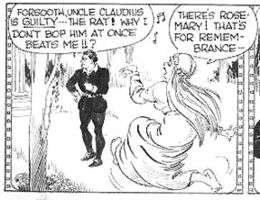F. O. Alexander
Franklin Osborne Alexander (November 3, 1897 – January 17, 1993), known professionally as F. O. Alexander, was a comic strip artist and editorial cartoonist.[1] He is credited for having designed the board game Monopoly, including the iconic mascots and characters.
| F. O. Alexander | |
|---|---|
| Born | Franklin Osborne Alexander November 3, 1897 St. Louis, Missouri, U.S. |
| Died | January 17, 1993 (aged 95) |
| Nationality | American |
| Area(s) | Syndicated cartoonist, editorial cartoonist |
Notable works | Hairbreadth Harry Philadelphia Bulletin political cartoonist |
| Awards | National Headliners Award, 1945 |

Biography
A native of St. Louis, Missouri, Alexander studied at the Chicago Academy of Fine Arts, taking several courses in cartooning and also attended Northwestern University.[1] In World War I he served with the Camouflage Engineers in Europe.[2]
During the mid-1920s, Alexander launched two comic strips, Finney of the Force (1925–31) and The Featherheads (1926–36),[3] but he is best known for the comic strip Hairbreadth Harry, which he took over in 1931 after the death of its creator, C. W. Kahles. Alexander did this strip for eight years and then dropped it in 1939.[4] Alexander also drew editorial cartoons for United Features Syndicate and, in 1941, he became the staff political cartoonist for the Philadelphia Bulletin. Alexander's career at the Bulletin spanned 26 years.
According to Smithsonian Magazine, Alexander designed the famous board game Monopoly for Parker Brothers in 1935, including creating the "Go to Jail" Officer Edgar Mallory, Jake the Jailbird, and mascot Milburn Pennybags characters.[5]
Alexander was the designer of the 1952 U.S. commemorative postage stamp honoring newspaper boys.
In 1966, Alexander donated more than 1000 of his cartoon originals to Syracuse University. The art is housed in the University's Special Collections Research Center.[6]
F. O. Alexander retired in 1967.[2]
Awards
His work was recognized by the Freedoms Foundation and the National Safety Council. In 1945 he received a National Headliners Award.[1]
References
- F.O. Alexander Papers 1943-1990 Syracuse University, 19 Aug 2010, Retrieved 11/30/2010
- Alexander bio, Lambiek Comiclopedia. Accessed Nov. 15, 2017.
- Franklin O. Alexander entry, The Comic Strip Project, "Who's Who of Comic Strip Producers", A-Part 1. WebCitation archive.
- Toonopedia "Archived copy". Archived from the original on 2012-04-13. Retrieved 2012-04-13.CS1 maint: archived copy as title (link)
- Pilon, Mary (January 2015). "Monopoly Was Designed to Teach the 99% About Income Inequality". Smithsonian Magazine.
- "Draw Your Own Conclusions: Political Cartooning Then and Now," Syracuse Library. Accessed Nov. 15, 2017.